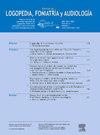Pragmatic and socioemotional competence in adolescents with DLD: An analysis of their interdependence
Q3 Nursing
引用次数: 0
Abstract
Introduction and objectives
Adolescence is a complex period of development, as it involves crucial challenges and changes at the cognitive, linguistic, and socio-emotional levels. In the context of Developmental Language Disorder (DLD), it is common for difficulties to increase in the face of new demands and challenges. The aim of this study is to determine the extent to which DLD typical linguistic limitations are associated with impairments in pragmatic and socio-emotional competence in adolescence, and whether one influences the other.
Materials and methods
Based on the work of Andrés-Roqueta and Conti-Ramsden and colleagues, the CCC-2 and SDQ parent versions were administered to a sample of 18 adolescents aged 10 and 18 years old, 9 of them with DLD and the other 9 with typical development.
Results
Significant differences were identified between the two groups, both in pragmatic and socio-emotional difficulties, while no differences were found in prosociality.
Conclusions
It was verified that deficits in pragmatics in adolescents with DLD are related to difficulties at a social and emotional level by hindering the development and maintenance of social relationships and by negatively affecting the expectation of self-efficacy and socio-emotional welfare. Consequently, it is concluded that speech therapy intervention for language and communication disorders must include the functional use of language in various contexts from an early age, as it will allow the development of satisfactory relationships and protection against exclusion, which will improve well-being in adolescence and long term.
青少年DLD的语用能力和社会情绪能力:相互依赖的分析
青春期是一个复杂的发展时期,因为它涉及认知、语言和社会情感层面的重大挑战和变化。在发展性语言障碍(DLD)的背景下,面对新的需求和挑战,困难增加是常见的。本研究的目的是确定DLD典型语言限制与青少年语用能力和社会情感能力障碍的关联程度,以及两者是否相互影响。材料与方法基于andr - roqueta和Conti-Ramsden及其同事的工作,对18名10岁和18岁的青少年进行CCC-2和SDQ父母版本的测试,其中9名患有DLD,另外9名发育正常。结果两组在实用主义和社会情感困难方面存在显著差异,而在亲社会性方面无显著差异。结论DLD青少年的语用缺陷与社会和情感层面的困难有关,阻碍了社会关系的发展和维持,并对自我效能感和社会情感福利的期望产生负面影响。因此,我们得出结论,语言和沟通障碍的言语治疗干预必须包括从早期开始在各种环境中使用语言的功能,因为它将允许发展令人满意的关系和防止排斥,这将改善青少年和长期的福祉。
本文章由计算机程序翻译,如有差异,请以英文原文为准。
求助全文
约1分钟内获得全文
求助全文
来源期刊

Revista de Logopedia, Foniatria y Audiologia
Nursing-LPN and LVN
CiteScore
1.10
自引率
0.00%
发文量
28
 求助内容:
求助内容: 应助结果提醒方式:
应助结果提醒方式:


